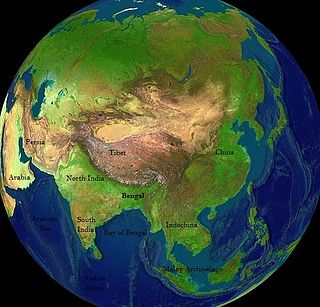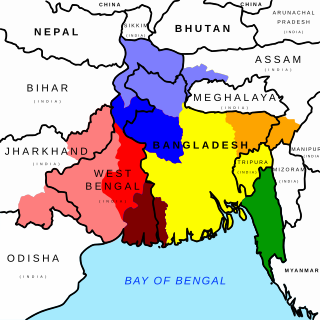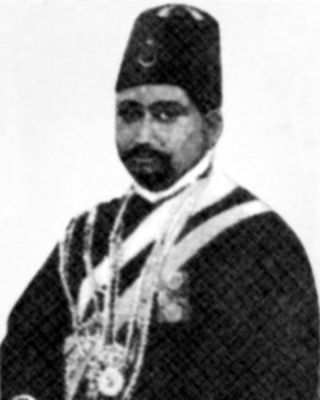Related Research Articles

Bengal is a historical geographical, ethnolinguistic and cultural term referring to a region in the eastern part of the Indian subcontinent at the apex of the Bay of Bengal. The region of Bengal proper is divided between the modern-day sovereign nation of Bangladesh and the Indian state of West Bengal.

Bengalis, also rendered as endonym Bangalee, are an Indo-Aryan ethnolinguistic group originating from and culturally affiliated with the Bengal region of South Asia. The population is divided between the sovereign country Bangladesh and the Indian regions of West Bengal, Tripura, Barak Valley, Goalpara, Andaman and Nicobar Islands, and parts of Meghalaya, Manipur and Jharkhand. Most speak Bengali, a language from the Indo-Aryan language family. Sub-section 2 of Article 6 of the Constitution of Bangladesh states, "The people of Bangladesh shall be known as Bengalis as a nation and as Bangladeshis as citizens."

Syed Ameer Ali Order of the Star of India was an Indian jurist, a prominent political leader, and author of a number of influential books on Muslim history and the modern development of Islam.

Syed Ismail Hossain Siraji was a Bengali author and poet from Sirajganj in present-day Bangladesh. He is considered to be one of the key authors of period of the Bengali Muslim reawakening; encouraging education and glorifying the Islamic heritage. He also contributed greatly to introducing the Khilafat Movement in Bengal, and provided medical supplies to the Ottoman Empire during the Balkan Wars. Anal-Prabaha, his first poetry book, was banned by the government and he was subsequently imprisoned as the first South Asian poet to allegedly call for independence against the British Raj. The government issued Section 144 against him 82 times in his lifetime.
The All India Muslim Students Federation (AIMSF) was an Indian Muslim students union affiliated with the All-India Muslim League. Splitting off from the All India Students' Federation in 1937, the body was organised under patronage of Muhammad Ali Jinnah in 1941 by his sister Fatima Jinnah and became an important part of the Pakistan Movement.

Shamsuddin Ilyas Shah was the founder of the Sultanate of Bengal and its inaugural Ilyas Shahi dynasty. The Ilyas Shahi Dynasty ruled Bengal for 145 years (1342–1487), except for a 21-year interregnum by the descendants of Raja Ganesha. Ilyas Shah was instrumental in unifying the principalities of Bengal into a single state.

Bangladesh's military history is intertwined with the history of a larger region, including present-day India, Pakistan, Nepal, Bhutan and Myanmar. The country was historically part of Bengal – a major power in South Asia and Southeast Asia.

The Bengal Sultanate (Middle Bengali: শাহী বাঙ্গালা, Classical Persian: سلطنت بنگاله was a late medieval sultanate based in the Bengal region in the eastern Indian subcontinent between the 14th and 16th century. It was the dominant power of the Ganges-Brahmaputra Delta, with a network of mint towns spread across the region. The Bengal Sultanate had a circle of vassal states in the Indian subcontinent, including parts of Odisha in the southwest, Arakan in the southeast, and Tripura in the east.

The Sylheti or Sylhetis are an Indo-Aryan ethnocultural group that are associated with the Sylhet region. There are strong diasporic communities in Barak Valley of Assam, India, North Tripura, as well as in rest of Bangladesh and northeast India. They speak Sylheti, an Eastern Indo-Aryan language that is considered "a distinct language by many and a dialect of Bengali by some others".

Bengali Muslims are adherents of Islam who ethnically, linguistically and genealogically identify as Bengalis. Comprising about two-thirds of the global Bengali population, they are the second-largest ethnic group among Muslims after Arabs. Bengali Muslims make up the majority of Bangladesh's citizens, and are the largest minority in the Indian states of West Bengal, Tripura and Assam.

ʿAlā ad-Dīn Fīrūz Shāh was the son and successor of Sultan Nasiruddin Nasrat Shah of Bengal. He served as a governor of Chittagong during his father's reign, and was a patron of Bengali literature. Firuz Shah ascended the throne in 1533, though it was not unanimously recognised by all the nobles of Bengal. The conflict with the Ahom kingdom continued during his reign and the Bengali army led by Turbak Khan had reached as far as Kaliabor. Within three months as Sultan, Firuz Shah was assassinated by his uncle, who succeeded him as Sultan Ghiyasuddin Mahmud Shah.
Abū al-Khayr Muḥammad Ayyūb ʿAlī al-Māturīdī, or simply Ayub Ali, was a Bangladeshi Islamic scholar, author and educationist. He was awarded the Ekushey Padak in 1976 by the Government of Bangladesh.
Khan Bahadur Abū Muḥammad ʿAbdul Ghafūr, better known by his pen name Nassakh, was a British Indian officer, writer, literary critic and collector. He is best known for his magnum opus Sukhan-e-Shuara which was a biography of prominent Urdu and Persian poets. He organised mushaira in places where he worked; inspiring young Urdu poets in Bengal.
The Khalji dynasty was the first Muslim dynasty to rule the Bengal region in the Indian subcontinent. The dynasty, which hailed from the Garmsir region of present-day Afghanistan, was founded in 1204 by Muhammad Bakhtiyar Khalji, a Muslim Turko-Afghan general of the Ghurid Empire. The Khaljis initially pledged allegiance to Sultan Muhammad of Ghor until his death in 1206, though their rule in Bengal was mostly independent. Under the rule of Iwaz Khalji, Bengal experienced major developments such as its first naval force, flood defence systems and linkage with the Grand Trunk Road. The dynasty was based in the city of Lakhnauti in northern Bengal, later expanding eastwards and southwards. Nasiruddin Mahmud, the son of Mamluk sultan Iltutmish of Delhi managed to conquer Bengal in 1227; although the Khaljis briefly reasserted their independence, they surrendered to the Mamluks in 1231, who replaced them with a series of regional governors.
Dobhashi or Dobhashi Bengali is a neologism used to refer to a historical register of the Bengali language which borrowed extensively, in all aspects, from Arabic and Persian. It became the most customary form for composing puthi poetry predominantly using the traditional Bengali alphabet. However, Dobhashi literature has also been produced in the Sylhet Nagri script, as well as in the modified Arabic scripts of Chittagong and Nadia. The standardisation of the modern Bengali language during the colonial period, eventually led to its decline.
Sharaf ad-Dīn Abū Tawʾamah was an Islamic scholar, author and muhaddith based in the subcontinent. He played a large role in disseminating Islam in eastern Bengal, establishing one of the country's first madrasas. According to A. F. M. Abdur Rahman, in addition to his proficiency in Persian and Arabic, he became well conversant in the local Old Bengali language of the time.
Majd ad-Dīn al-Madanī, also known as Madan Shāhjahānpūrī, was an 18th-century Indian Muslim theologian. He served as the first principal of the Calcutta Madrasa, the first Alia Madrasa of Bengal.

The Greater Jessore region predominantly includes the districts of Jessore, Jhenaidah, Narail and Magura in Bangladesh, as well as the Bangaon subdivision of India. Nestled close to the Sundarbans, the region experienced human settlement early on. It served as the capital city of the Samatata realm and passed through several Buddhist and Hindu kingdoms such as the Palas and Senas. Jessore was ruled by Khan Jahan Ali of Khalifatabad, under the Muslim Sultanate of Bengal, who is credited with establishing the Qasbah of Murali and urbanising the region through advancements in transportation and civilization. Jessore later came to be ruled by various chieftains such as Pratapaditya and became familiar to contemporary European travellers as Chandecan before being annexed to the Mughal Empire in the seventeenth century. By 1757, the British East India Company had dominated and started to establish themselves in the region. British rule lasted up until 1947, with Jessore coming under the Provisional Government of Bangladesh from 1971 onwards.

Nūr Qut̤b ʿĀlam was a 14th-century Bengali Islamic scholar, author and poet. Based in the erstwhile Bengali capital Hazrat Pandua, he was the son and successor of Alaul Haq, a senior scholar of the Bengal Sultanate. He is noted for his efforts in preserving the Muslim rule of Bengal against Raja Ganesha and pioneering the Dobhashi tradition of Bengali literature.

ʿAbd al-Awwal Jaunpūrī was an Indian Muslim scholar, religious preacher, educationist, poet and author. Described by Muhammad Mojlum Khan as one of the "most gifted and outstanding" of Karamat Ali Jaunpuri's many children, he displayed an important role leading his father's founded Taiyuni reformist movement in Bengal.
References
- ↑ Abdul Karim (2012). "Tabaqat-i-Nasiri". In Islam, Sirajul; Miah, Sajahan; Khanam, Mahfuza; Ahmed, Sabbir (eds.). Banglapedia: the National Encyclopedia of Bangladesh (Online ed.). Dhaka, Bangladesh: Banglapedia Trust, Asiatic Society of Bangladesh. ISBN 984-32-0576-6. OCLC 52727562. OL 30677644M . Retrieved 10 September 2024.
- ↑ M. I. Borah (1936). Baharistan-I-Ghaybi – Volume 1.